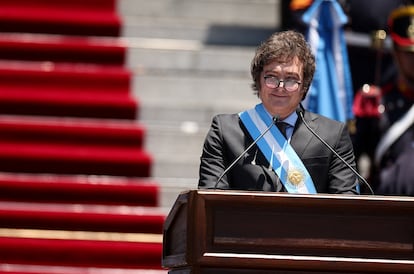The inauguration of Javier Milei has Argentina wondering what kind of president it will get
On Sunday morning, Milei was sworn in inside the National Congress building, and outgoing President Alberto Fernández placed the presidential sash upon him

As right-wing economist Javier Milei assumed Argentina’s presidency on Sunday, the nation wonders which version of him will govern: the chainsaw-wielding, anti-establishment crusader from the campaign trail, or the more moderate president-elect who emerged in recent weeks.
Milei, 53, rose to fame on television with profanity-laden tirades against what he called the political caste. He parlayed his popularity into a congressional seat and then, just as swiftly, into a presidential run. The overwhelming victory of the self-declared “anarcho-capitalist” in the August primaries sent shock waves through the political landscape and upended the race.
Argentines disillusioned with the economic status quo — triple-digit inflation, four in 10 people in poverty, a plunging currency — proved receptive to an outsider’s outlandish ideas to remedy their woes and transform the nation. He won the election’s Nov. 19 second round decisively — and sent packing the Peronist political force that dominated Argentina for decades.
On Sunday morning, Milei was sworn in inside the National Congress building, and outgoing President Alberto Fernández placed the presidential sash upon him. Some of the assembled lawmakers chanted “Liberty!”
As a candidate, Milei pledged to purge the political establishment of corruption, eliminate the Central Bank he has accused of printing money and fueling inflation, and replace the rapidly depreciating peso with the U.S. dollar.
But after winning, he tapped Luis Caputo, a former Central Bank president, to be his economy minister and one of Caputo’s allies to helm the bank, appearing to have put his much-touted plans for dollarization on hold.
Milei had cast himself as a willing warrior against the creep of global socialism, much like former U.S. president Donald Trump, whom he openly admires. But when Milei traveled to the U.S. last week, he didn’t visit Mar-a-Lago; rather, he took lunch with another former U.S. leader, Bill Clinton.
He also dispatched a diplomat with a long history of work in climate negotiations to the ongoing COP28 conference in Dubai, Argentine newspaper La Nacion reported, despite having insistently rejected humanity’s involvement in global warming. And he backtracked on plans to scrap the nation’s health ministry.
His moderation may stem from pragmatism, given the scope of the immense challenge before him, his political inexperience and need to sow up alliances with other parties to implement his agenda in Congress, where his party is a distant third in number of seats held.
He chose Patricia Bullrich, a longtime politician and first-round adversary from the coalition with the second most seats, to be his security minister, as well as her running mate, Luis Petri, as his defense minister.
Still, there are signs that Milei has given up neither his defiance nor his radical plans to dismantle the state.
After his swearing-in, he intends to break tradition by delivering his inaugural address not to assembled lawmakers but to his supporters gathered outside the National Congress building — with his back turned to the legislature.
He is expected to refer to the economic travails he is inheriting from outgoing President Alberto Fernández and to announce his first executive actions, including a drastic cut to public spending.
Argentina has a yawning fiscal deficit, a trade deficit of $43 billion, plus a daunting $45 billion debt to the International Monetary Fund, with $10.6 billion due to the multilateral and private creditors by April.
“There’s no money,” is Milei’s common refrain.
Already he has said he will eliminate multiple ministries, including those of culture, environment, women, and science and technology. He wants to meld the ministries of social development, labor and education together under a single ministry of human capital.
However, Milei is likely to encounter fierce opposition from the Peronist movement’s lawmakers and the unions it controls, whose members have said they refuse to lose wages.
Following his inaugural address, Milei plans to proceed in a convertible to the presidential palace and later meet with foreign dignitaries.
Prominent far-right figures will be among them: Hungarian Prime Minister Viktor Orbán; the head of Spain’s Vox party, Santiago Abascal; former Brazilian President Jair Bolsonaro and Bolsonaro-allied lawmakers, including his son.
Milei reportedly sent a letter inviting Brazil’s current president, Luiz Inácio Lula da Silva, after calling the leftist “obviously” corrupt last month during a televised interview and asserting that, if he became president, the two would not meet.
Lula dispatched his foreign minister to attend Milei’s inauguration.
Also expected is Ukrainian President Volodymyr Zelenskyy, who is making his first visit to Latin America since Russia’s invasion of his country in February 2022.
Sign up for our weekly newsletter to get more English-language news coverage from EL PAÍS USA Edition
Tu suscripción se está usando en otro dispositivo
¿Quieres añadir otro usuario a tu suscripción?
Si continúas leyendo en este dispositivo, no se podrá leer en el otro.
FlechaTu suscripción se está usando en otro dispositivo y solo puedes acceder a EL PAÍS desde un dispositivo a la vez.
Si quieres compartir tu cuenta, cambia tu suscripción a la modalidad Premium, así podrás añadir otro usuario. Cada uno accederá con su propia cuenta de email, lo que os permitirá personalizar vuestra experiencia en EL PAÍS.
¿Tienes una suscripción de empresa? Accede aquí para contratar más cuentas.
En el caso de no saber quién está usando tu cuenta, te recomendamos cambiar tu contraseña aquí.
Si decides continuar compartiendo tu cuenta, este mensaje se mostrará en tu dispositivo y en el de la otra persona que está usando tu cuenta de forma indefinida, afectando a tu experiencia de lectura. Puedes consultar aquí los términos y condiciones de la suscripción digital.








































